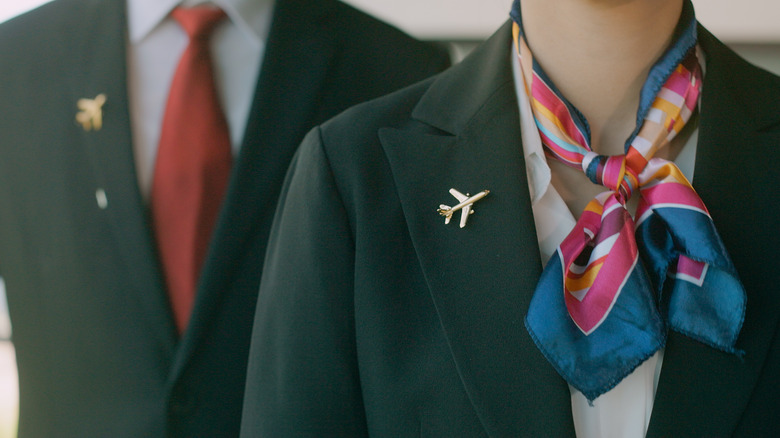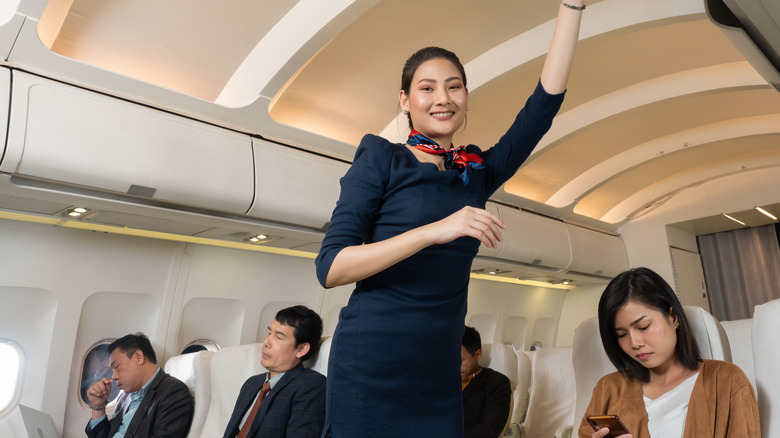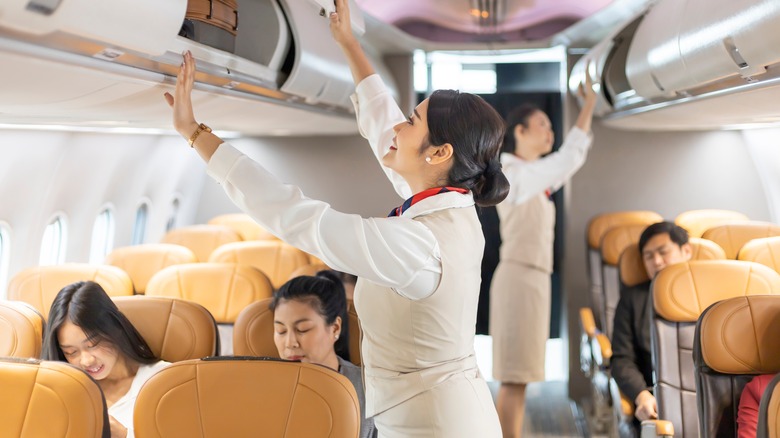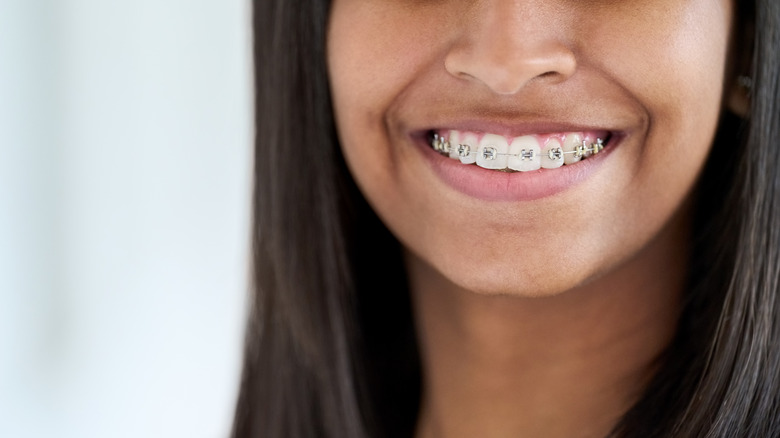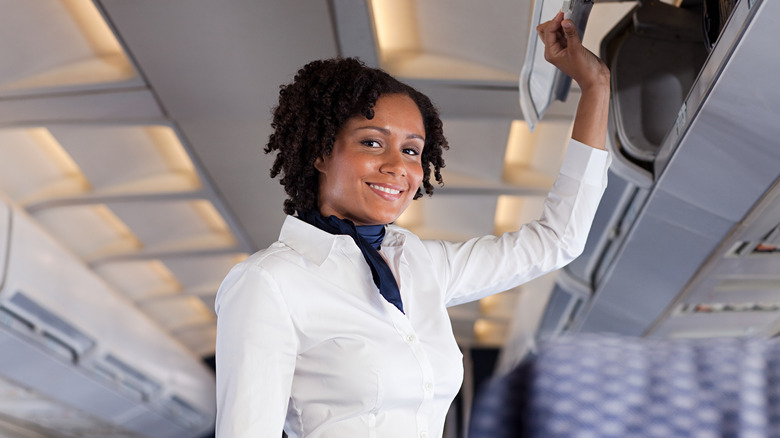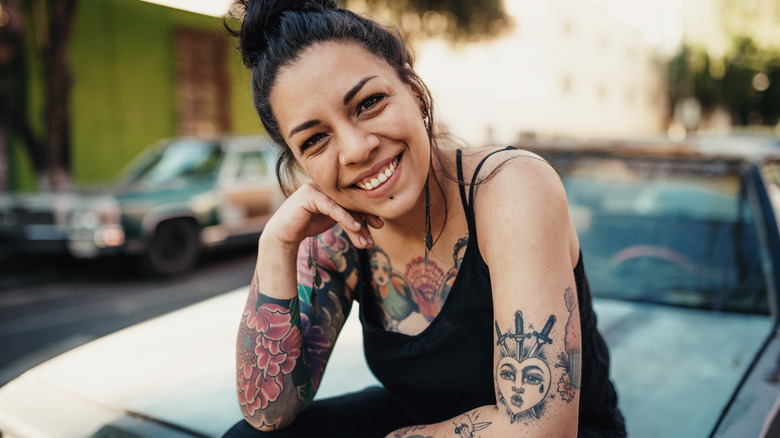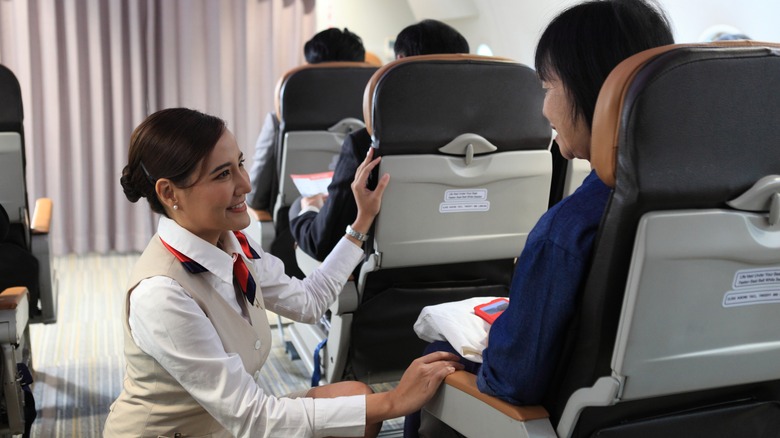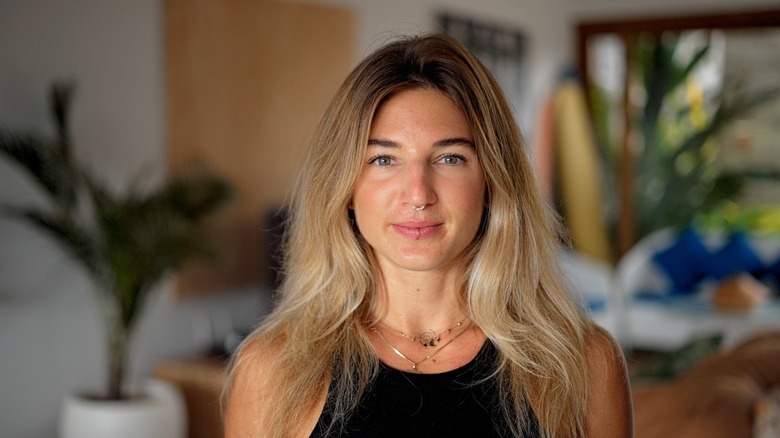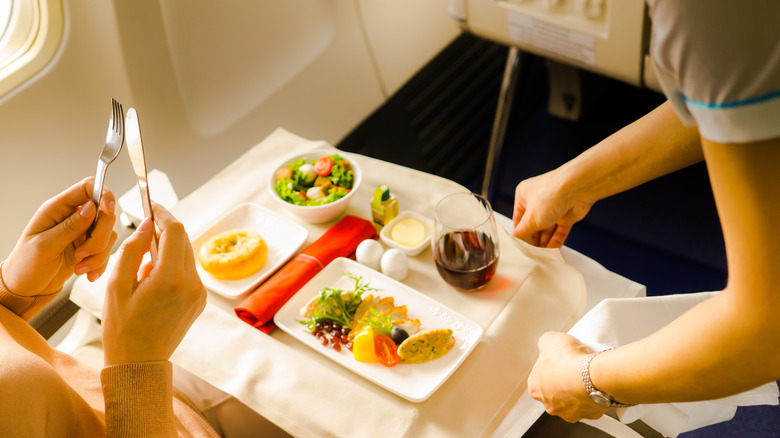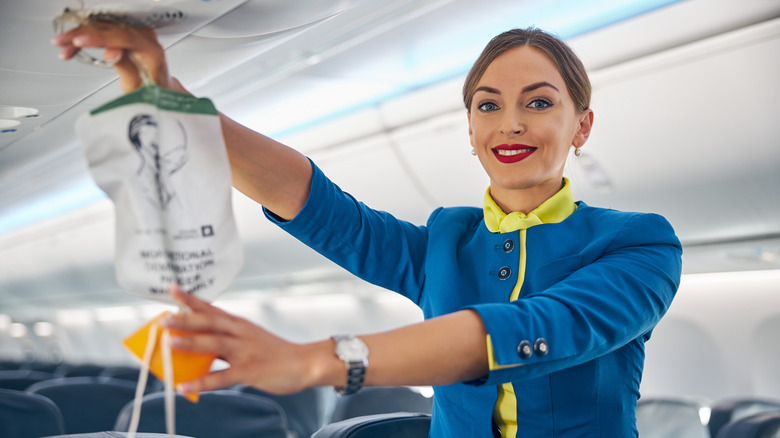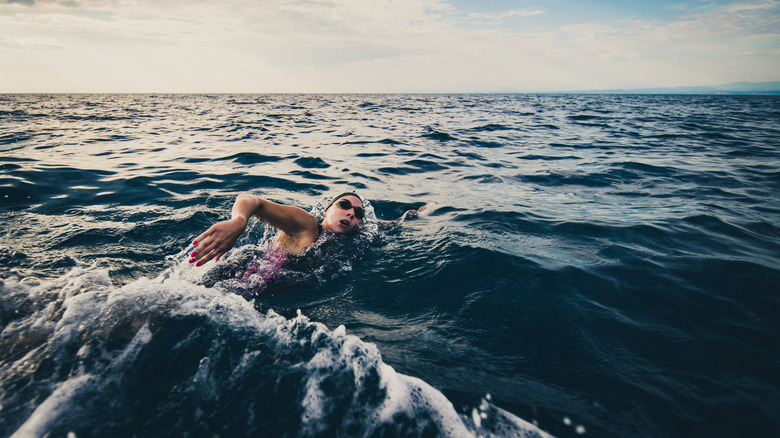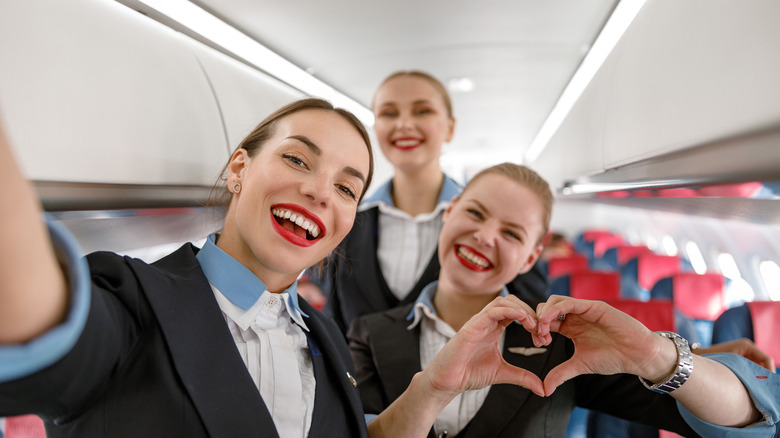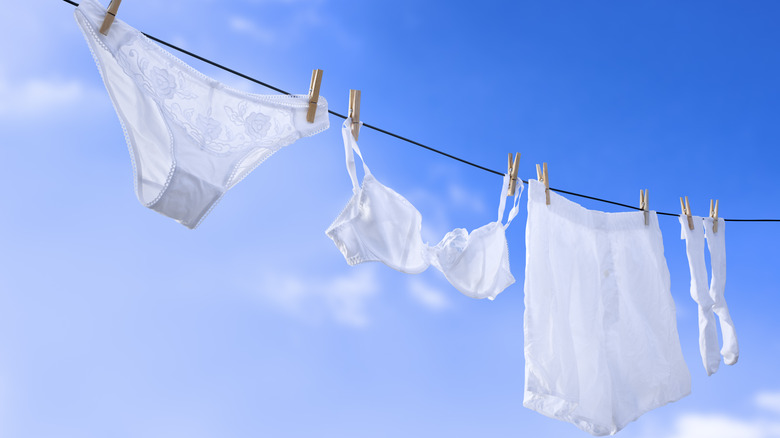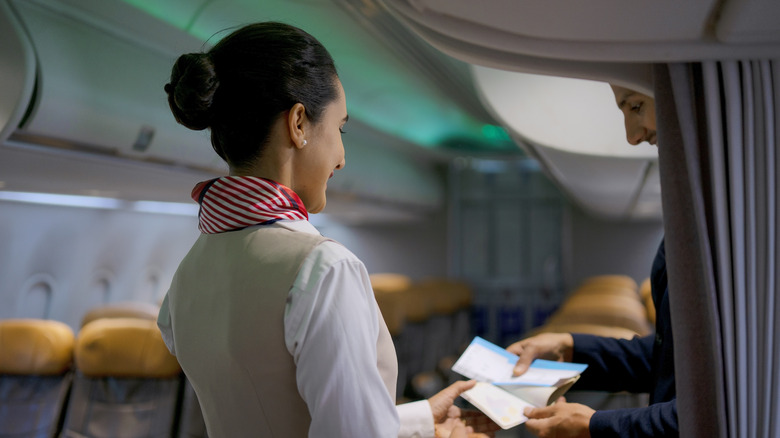The Strangest Requirements In Place To Become A Flight Attendant
Being a flight attendant is a dream job for many people. After all, you get to fly to incredible destinations, meet people from all over the world, and get paid to do it. However, not just anyone can be a flight attendant. Many airlines have very specific requirements in place, some of which can seem pretty bizarre. From height regulations to hair restrictions, cabin crew often have to meet certain criteria and abide by strict rules that you don't find in many other lines of work.
While many professions have clearly laid out requirements to enter the field that are more or less universal, such as specialized knowledge and training, the prerequisites for flight attendants can vary from airline to airline. Some airlines are clear-cut about how their cabin crew must look and act, while others require trainees to take specialized courses that go above and beyond basic safety training. These are some of the strangest cabin crew requirements from various airlines around the world that might make you scratch your head.
You must be taller than 5 feet, 2 inches tall
If you're on the shorter side, a career as a flight attendant might not be in the cards, as many airlines have height requirements in place for cabin crew. This is to ensure that crew members can reach the overhead bins and perform safety procedures. The minimum height typically ranges between 5-foot-1-inch and 5-foot-3-inches. Some airlines also have a maximum height restriction. For example, Qantas cabin crew members can't be taller than 6 feet.
However, not all hope is lost for shorter flight attendant hopefuls. A former flight attendant on Reddit explained that their airline hired petite flight attendants but that the shorter hires had to sign a waiver. The user said this was because "you are supposed to hold the assist handle while opening the main cabin door because if the cabin isn't properly depressurized, out you go. Short F/A's sign a waiver that they understand they could be injured and hold the side of the wall when opening the MCD instead."
You must be able to reach 6 feet and 8 inches high
Being tall isn't the only height requirement for many airlines. Some also insist their cabin members have an arm reach of at least 6-foot-8-inches. Again, this is because flight attendants must be able to open and close the overhead bins, and cabin crew must also be able to reach deep inside the bins. Unfortunately, many passengers aren't well-versed in overhead bin etiquette, so flight attendants often need to rearrange items in the bins to make more space or allow the bin doors to close.
Another reason that airlines require cabin members to have a long reach is for safety. Some aircraft have safety equipment and mechanisms like circuit breakers in lofty places, so cabin crew must be able to access them in the case of an emergency. Many airlines include a reach test as part of the onboarding process, where candidates must reach a particular point with either their fingertips or entire palms. Some allow candidates to wear shoes and sometimes even high-heel shoes during the test, while others have a strict no-shoe policy.
You can't have braces
Many airlines place great emphasis on appearances, requiring cabin crew to be well-groomed and presentable. Some airlines take it even further, expecting flight attendants to have perfect smiles. Braces can be a deal-breaker when it comes to landing a cabin crew job with particular airlines. Apparently, a wire-free smile is more critical than knowing how to handle turbulence. But hey, it's all to project that flawless image of professionalism and charm.
Several airlines in Asia and the Middle East don't hire cabin crew with braces, including AirAsia, Emirates, Singapore Airlines, and Air India. Some airlines will allow flight attendants to have braces as long as they are clear. For example, Etihad Airways cabin crew member Alexander George explained on YouTube, "Braces are allowed as long as they're those invisible ones. Even if they're the metal ones, they have to be invisible, they have to be transparent, or they have to be the same kind of color as your teeth." The good news is that most airlines in North America, Europe, and Australia don't have a problem with employees having braces.
You must have flawless skin
You may be tall, have a long arm reach, and be braces-free, but even that's not enough for some airlines. Some also require you to have an impeccable complexion. In a recent AirAsia job posting, the airline stated that some of the things they look for include "flawless skin (without acne marks)" and "no visible marks on the hands and legs." Moreover, according to the Air India Cabin Crew Handbook uploaded on Live and Let's Fly, "Crew must take good care of their skin in order to have a flawless makeup look. A clear and acne free skin is a prerequisite for flight duties."
Thankfully, airlines that require nothing less than complexion perfection are few and far between. That being said, many encourage cabin crew to keep up a healthy skincare routine. Meghan Singleton of Blogger at Large reported that the Emirates training school in Dubai gives classes on the importance of skincare and how to properly cleanse, moisturize, and tone skin. They also teach recruits about the effects of flying on the skin and how to keep up with your skincare on a long flight.
You can't have visible tattoos
The next time you're on a flight, take note of how many flight attendants you see with tattoos. We're willing to bet that you won't be able to spot many. You might not see any at all. That's because many airlines will not hire flight attendants with tattoos that could be visible to the public. For example, American Airlines has a strict rule that no body art can be visible when cabin crew are in uniform. Likewise, Delta Appearance Requirement Guidelines says, "Visible tattoos or visible body piercings are not permitted."
While more airlines than not forbid cabin crew from displaying tattoos at work, there are a few exceptions. Southwest Airlines responded to a query about flight attendants having tattoos on their forum by saying, "You are allowed to have visible tattoos on your hands, arms, wrists, legs and feet." However, they stated that the tattoos cannot be larger than your Southwest employee badge. Other airlines that allow tattoos include Virgin Atlantic, United, and Air New Zealand.
You must be in excellent health
If you want to be a flight attendant, you better not be a couch potato — at least according to some airlines. Take Qatar Airways, for example, which lists "excellent health and fitness" as one of the cabin crew requirements. One of the minimum requirements for Japan Airlines cabin crew is that candidates "Must be healthy and able to adapt to changes in weather conditions." Some airlines even have body mass index (BMI) requirements for cabin crew.
It may seem odd or even discriminatory for an airline to require employees to be fit and in good health, but it mostly comes down to the physicality of the job. Flight attendants have to stoop, bend, and stretch often. They must also push heavy food and beverage carts, stow heavy bags in the overhead bins, and potentially open heavy emergency doors. Plus, flight attendants are often on their feet for extended periods throughout the flight — the reason why airline crew secretly enjoy turbulence is because it gives them time to sit and rest for a bit.
You must be a gracious host
A big part of a flight attendant's job is providing hospitality, so it isn't a shock to hear that standard requirements for the job include good communication and interpersonal skills. Many airlines also encourage their crew to be ambassadors for the brand, offering exceptional service that goes above and beyond simply serving drinks and helping passengers find their seats. Some get pretty specific about the personality traits they desire.
Air Canada lists some key success factors for potential flight attendants that include being "customer-obsessed" and "a gracious Canadian host" who will "represent the best of Canada and exemplify the qualities that make our country great: hospitality, warmth, care, empathy." Japan Airlines states that flight attendants must have a "pleasant personality with a positive work attitude." Air New Zealand says "You must be a people person with great enthusiasm and passion for flying as well the innate ability to smile and welcome your passengers on a daily basis." The bottom line is a bad attitude is never acceptable, even when dealing with the worst types of travelers.
You can't have facial piercings
If you want to be a flight attendant and have visible piercings (other than in your earlobes), the airline will most likely ask you to take them out at work. Most airlines do not allow any type of facial fashion accessories, including nose rings, lip rings, or eyebrow rings. United sums up the collective thinking of most airlines in its Flight Attendant Uniform Appearance Standards guide, saying, "Visible body piercing (including tongue piercing) other than earlobes is not permitted while in uniform."
Facial piercings are not the only thing airlines regulate. Many have strict guidelines about earrings, dictating how many you can wear, how big they must be, and even what style you can wear. For example, American Airlines only allows one earring per lobe, which cannot be larger than one inch. United Airlines says the earrings "may be gold, silver, pearl, precious or semi-precious gemstones that complement the uniform." As a rule, many airlines will not allow cuffs, barbells, or ear gauges.
You must take food and wine appreciation courses
It's no secret that airplane food can be downright terrible. You don't even get a proper meal on some airlines anymore, just some disappointing snacks. However, many higher-end airlines aim to impress with excellent in-flight beverage service programs, gourmet airplane snacks, and menus designed by professional chefs. If you land a job with one of these carriers, you may have to take food and wine courses to ensure you know your Chablis from your Châteauneuf-du-Pape. Many airlines expect you to be able to provide five-star service, which could include answering passenger questions about dishes and responding to requests about dietary restrictions.
One airline that takes its in-flight service seriously is Singapore Airlines. The airline consistently ranks as one of the airlines with the best customer service in the world, and that's primarily due to the rigorous training the cabin crew undergoes. According to the company's Crew Training Procedures, cabin crew must undergo a 15-week training program that includes food and wine appreciation courses. Emirates is another top-rated airline that provides cabin crew training in fine dining service, including cocktail mixing.
You must wear makeup
You may have noticed that many flight attendants look ultra-glamorous with impeccable makeup that wouldn't look out of place on a fashion shoot. That may not be a personal choice. Some airlines require flight attendants to wear makeup, even going so far as to dictate what colors can be worn and how the makeup should be applied. Emirates is famous for encouraging female flight attendants to wear its signature "Emirate's red" lipstick. According to Cosmetic Business, the company collaborated with Dior and Davines to create the Emirates Beauty Hub, where staff can receive recommendations about which makeup brands and colors to use.
Those who prefer to go au natural might be happy to know that many airlines are changing with the times and relaxing their makeup rules. In 2021, Axios reported that United Airlines updated its makeup rules to be more inclusive, allowing people of any gender to wear natural-looking makeup. In 2019, Virgin Atlantic announced that cabin crew can work with or without makeup according to personal choice. Other airlines that do not have makeup requirements include Delta and American Airlines.
You must be able to swim 82 feet
The ability to swim is a non-negotiable requirement for prospective flight attendants. It's part of the emergency training, as many airlines fly over bodies of water. In the event of a landing on water or a crash, it's critical that cabin crew can at least tread water, and even better if you can swim unaided and assist passengers and other crew members while in the water. If you're thinking about taking to the skies as a career move, you should also brush up on your water skills.
The specific swimming requirements vary from airline to airline. At the very least, many airlines insist that you must be able to swim up to 25 meters (82 feet) unassisted. If you get hired, you may have to do a swimming test as part of your training. Depending on the airline, you may be required to swim on your own or with life jackets or flotation devices. The trainers may assess your ability to tread water, swim underwater, and board a life raft.
You can't be older than 35
Most airlines have a minimum age requirement for prospective cabin crew members, with many stating that flight attendants must be at least 18 to 21 years old. Although it's rare to find an upper age limit, it's not unheard of. While the United States has the Age Discrimination in Employment Act that prohibits discrimination against people 40 or older, there are no such laws in several other countries. Hence, airlines can require flight attendants to be under a certain age.
Asian airlines, in particular, seem to be more hung up with having youthful flight attendants than airlines on other continents. Air India is one airline that considers age as part of its eligibility criteria for flight attendants. According to the Tata Group website, Air India's age limit for "freshers" is 18 to 27 years old. For experienced crew, the limit is 35 years. Malaysia Airlines is another airline that states that potential cabin crew must be aged between 18 and 35 years old. According to the South China Morning Post, Chinese airlines will not employ flight attendants over the age of 40 and will even assign cabin crew to other roles once they hit that age.
You must wear underwear
If you're a fan of going commando, a cabin crew position might not be the best job for you. Many airlines explicitly state that underwear is an essential part of the uniform. For example, Delta Airlines states in its Appearance Requirement Guidelines that "Proper undergarments must be worn, but not visible." United Airlines also states that "basic undergarments are required and must be an appropriate color," although it doesn't specify what qualifies as an appropriate color.
Many airlines also have strict regulations about hosiery and socks. United Airlines states that female flight attendants must wear hosiery at all times with the uniform and that it can only be sheer black or flesh-toned. It also states that "extra hosiery is to be carried." If pants are worn, both female and male flight attendants can only wear solid black socks, and the socks must extend above the pant leg when the legs are crossed. Delta is a bit more lenient, stating that colorful socks can be worn as long as they don't feature words or characters.
Your hair must be a natural color
Hair is another aspect of appearance that many airlines have strict regulations about. At the very least, many airlines require that hair is clean and neat in appearance. Some airlines also have restrictions on the color of your hair. Alaska Airlines states that "hair must be of natural color." Likewise, Delta Airlines says, "Color must be of a natural hue. No stark highlights or unnatural shades." Air India requires crew members with gray hair to dye their hair in a "natural shade" or company-approved color.
If you ever noticed that flight attendants always have their hair up, that's also because of airline regulations. Part of the reason is that it looks neater and is more hygienic, especially when serving food and drinks. However, as a flight attendant named Rania explained on TikTok, the other reason long hair must be kept up is because it needs to be out of your face if an emergency happens. She also stated that it "looks more professional for the company."
